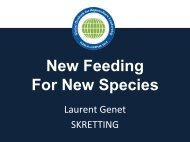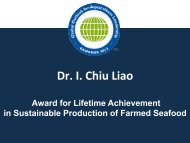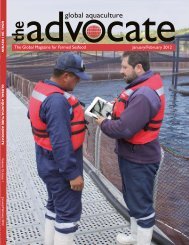May/June 2010 - Global Aquaculture Alliance
May/June 2010 - Global Aquaculture Alliance
May/June 2010 - Global Aquaculture Alliance
Create successful ePaper yourself
Turn your PDF publications into a flip-book with our unique Google optimized e-Paper software.
GLOBAL AQUACULTURE<br />
ALLIANCE<br />
The <strong>Global</strong> <strong>Aquaculture</strong> Al li ance is an international<br />
non-profit, non-gov ernmental<br />
association whose mission is to further en viron<br />
men tally responsible aqua culture to meet<br />
world food needs. Our members are producers,<br />
pro cessors, marketers and retailers of seafood<br />
prod ucts worldwide. All aqua culturists<br />
in all sectors are welcome in the organization.<br />
OFFICERS<br />
George Chamberlain, President<br />
Bill Herzig, Vice President<br />
Ole Norgaard, Secretary<br />
Lee Bloom, Treasurer<br />
Wally Stevens, Executive Director<br />
BOARD OF DIRECTORS<br />
Bert Bachmann<br />
Lee Bloom<br />
Rittirong Boonmechote<br />
George Chamberlain<br />
Shah Faiez<br />
John Galiher<br />
Bill Herzig<br />
Ray Jones<br />
Alex Ko<br />
Jordan Mazzetta<br />
Sergio Nates<br />
Ole Norgaard<br />
John Peppel<br />
Antonio Pino<br />
John Schramm<br />
Iain Shone<br />
Wally Stevens<br />
EDITOR<br />
DARRYL JORY<br />
editorgaadvocate@aol.com<br />
PRODUCTION STAFF<br />
ASSISTANT EDITOR<br />
DAVID WOLFE<br />
davidw@gaalliance.org<br />
MARKETING/ADVERTISING<br />
SALLY KRUEGER<br />
sallyk@gaalliance.org<br />
GRAPHIC DESIGNER<br />
LORRAINE JENNEMANN<br />
lorrainej@gaalliance.org<br />
HOME OFFICE<br />
5661 Telegraph Road, Suite 3A<br />
St. Louis, Missouri 63129 USA<br />
Telephone: +1-314-293-5500<br />
FAX: +1-314-293-5525<br />
E-mail: homeoffice@gaalliance.org<br />
Website: http://www.gaalliance.org<br />
All contents copyright © <strong>2010</strong><br />
<strong>Global</strong> <strong>Aquaculture</strong> <strong>Alliance</strong>.<br />
<strong>Global</strong> <strong>Aquaculture</strong> Advocate<br />
is printed in the USA.<br />
ISSN 1540-8906<br />
from the president<br />
Past The<br />
Tipping Point<br />
Three years ago, I wrote that the <strong>Global</strong> <strong>Aquaculture</strong><br />
<strong>Alliance</strong> seemed to be approaching a tipping point.<br />
A tipping point is the threshold before which<br />
small changes have little or no effect, but after which<br />
further small changes “tip” the system, resulting in a<br />
large effect. The term originated in the field of epidemiology,<br />
where it is used to describe the point at<br />
which an infectious disease reaches the outbreak<br />
stage. It has also been used to describe the point at<br />
which global warming stops ocean currents, leading<br />
to major climatic change. Some have even used it to<br />
describe the phenomena by which products or individuals rise from anonymity to popular<br />
demand or celebrity status.<br />
GAA’s tipping point involves Best <strong>Aquaculture</strong> Practices (BAP) certification. For nearly<br />
a decade, we steadily pursued BAP’s principles, which resulted in incremental advances in<br />
the program’s circle of supporters and overall reach. Three years ago BAP certification, then<br />
based only on shrimp, was adopted by Wal-Mart and Darden Restaurants, and progress<br />
began accelerating. A critical mass of support developed through unexpected new linkages<br />
and synergies. Soon, the tipping point threshold was reached – and surpassed.<br />
Now, the BAP certification program has been adopted by most major retailers in the<br />
United States and is gaining traction in the United Kingdom and elsewhere. Over<br />
500,000 mt of seafood from BAP-certified facilities enter the global market annually,<br />
and GAA has become the world’s leading<br />
aquaculture standard-setting organization.<br />
Many exciting developments are under<br />
way. The BAP standards have broadened to<br />
include channel catfish and tilapia. New<br />
standards for feed mills, Pangasius farms and<br />
salmon farms are expected soon, and a technical<br />
committee for mussel farm standards is<br />
forming. The United States Food and Drug<br />
Administration pilot study on food safety<br />
verification has been completed, and the <strong>Global</strong> Food Safety Initiative is expected to<br />
benchmark the BAP processing plant standards in a few weeks.<br />
To help the BAP program meet the challenges of mainstream certification, GAA is<br />
reorganizing its structure to integrate functions, expand outreach and improve efficiency.<br />
It has formed a charitable organization called the Responsible <strong>Aquaculture</strong><br />
Foundation (RAF), which will house the BAP Standards Oversight Committee, technical<br />
committees and training, research and development functions. One of the first<br />
international missions of the newly formed RAF will be a cooperative program with<br />
Malaysia’s Department of Fisheries and Ministry of Health to help train aquaculture<br />
producers in environmental, social and food safety excellence.<br />
We are especially pleased with the strong response from sister aquaculture associations<br />
around the world to our reciprocal membership program. This will help improve<br />
communication and coordination at many levels.<br />
Thank you for throwing your weight behind the BAP effort to tip the scales toward<br />
a brighter and more sustainable future for aquaculture. It is thrilling to see the ongoing<br />
progress being achieved at so many levels. This could not have been realized without<br />
your dedicated support.<br />
Sincerely,<br />
George W. Chamberlain<br />
George W.<br />
Chamberlain, Ph.D.<br />
President<br />
<strong>Global</strong> <strong>Aquaculture</strong> <strong>Alliance</strong><br />
georgec@gaalliance.org<br />
Thank you for throwing<br />
your weight behind the<br />
BAP effort to tip the scales<br />
toward a brighter<br />
and more sustainable<br />
future for aquaculture.<br />
from the editor<br />
Readers Respond<br />
To Digital Advocate<br />
Feedback received by me and other members<br />
of the <strong>Global</strong> <strong>Aquaculture</strong> <strong>Alliance</strong> staff has indicated<br />
that the exciting change we introduced to<br />
the <strong>Global</strong> <strong>Aquaculture</strong> Advocate magazine in its last<br />
issue – a digital edition – has been well received.<br />
This is very encouraging to us.<br />
Like its print-based Advocate “sister,” the new<br />
digital Advocate continues to include the up-todate,<br />
factual industry information that is our<br />
trademark, but makes it available online in forms<br />
that are easily downloaded and stored electronically. This content will remain permanently<br />
available on our website or in your electronic storage.<br />
Our goal in distributing the Advocate electronically is to further GAA’s mission<br />
of “feeding the world through responsible<br />
aquaculture” by focusing attention on the<br />
Best <strong>Aquaculture</strong> Practices program and<br />
certified facilities around the world, on<br />
sustainability developments in the marketplace<br />
and on new technologies that<br />
improve production efficiency and sustainability.<br />
The digital Advocate is available free<br />
at www.gaalliance.org.<br />
Going forward, we will continue our<br />
coverage of the entire seafood production<br />
value chain, keeping an eye on the rapid<br />
expansion of the aquaculture industry<br />
driven by increasing global seafood<br />
demand. Through this coverage, we will pay particular attention to potential<br />
impacts, life cycle assessments and long-term sustainability issues.<br />
Another change we are introducing with this issue is our further effort to<br />
become more environmentally responsible. This magazine is printed on paper stock<br />
with at least 10% post-consumer recycled content. In addition, the masthead<br />
includes the logo of the Sustainable Forestry Initiative certification system for<br />
responsible forestry practices.<br />
The Sustainable Forestry Initiative (SFI) standard addresses issues like worker<br />
health and safety, civil rights, anti-discrimination and fair wages. The SFI mark is a<br />
sign that wood and paper products are bought from a responsible source, backed by<br />
a rigorous, third-party certification audit.<br />
As always, we encourage your suggestions for current topics you would like us to<br />
cover, as well as your contributions of short articles that are aligned with our mission<br />
to support responsible aquaculture. Please contact me at your convenience for<br />
details about our article submission guidelines.<br />
Through the years, your critical comments have significantly improved our magazine,<br />
and I urge you to continue sending us your comments on how we can best<br />
represent and serve our industry.<br />
Thank you for your continuing support.<br />
2 <strong>May</strong>/<strong>June</strong> <strong>2010</strong> global aquaculture advocate global aquaculture advocate <strong>May</strong>/<strong>June</strong> <strong>2010</strong> 3<br />
Sincerely,<br />
Darryl E. Jory<br />
Darryl E. Jory, Ph.D.<br />
Editor<br />
<strong>Global</strong> <strong>Aquaculture</strong> Advocate<br />
editorgaadvocate@aol.com<br />
FOUNDING MEMBERS<br />
Agribrands International Inc.<br />
Agromarina de Panama, S.A.<br />
Alicorp S.A. – Nicovita<br />
Aqualma – Unima Group<br />
Aquatec/Camanor<br />
Asociación Nacional de Acuicultores de Colombia<br />
Asociación Nacional de Acuicultores de Honduras<br />
Associação Brasileira de Criadores de Camarão<br />
Bangladesh Chapter – <strong>Global</strong> <strong>Aquaculture</strong> <strong>Alliance</strong><br />
Belize <strong>Aquaculture</strong>, Ltd.<br />
Bluecadia <strong>Aquaculture</strong> Group, LLC<br />
Bluepoints Co., Inc.<br />
Cámara Nacional de Acuacultura<br />
Camaronera de Cocle, S.A.<br />
Cargill Animal Nutrition<br />
Continental Grain Co.<br />
C.P. <strong>Aquaculture</strong> Business Group<br />
Darden Restaurants<br />
Deli Group, Ecuador<br />
Deli Group, Honduras<br />
Diamante del Mar S.A.<br />
Eastern Fish Co.<br />
El Rosario, S.A.<br />
Empacadora Nacional, C.A.<br />
Empress International, Ltd.<br />
Expack Seafood, Inc.<br />
Expalsa – Exportadora de Almientos S.A.<br />
FCE Agricultural Research<br />
and Management, Inc.<br />
Fishery Products International<br />
India Chapter – <strong>Global</strong> <strong>Aquaculture</strong> <strong>Alliance</strong><br />
Indian Ocean <strong>Aquaculture</strong> Group<br />
INVE <strong>Aquaculture</strong>, N.V.<br />
King & Prince Seafood Corp.<br />
Long John Silver’s, Inc.<br />
Lu-Mar Lobster & Shrimp Co.<br />
Lyons Seafoods Ltd.<br />
Maritech S.A. de C.V.<br />
Meridian Aquatic Technology Systems, LLC<br />
Monsanto<br />
Morrison International, S.A.<br />
National Food Institute<br />
National Prawn Co.<br />
Ocean Garden Products, Inc.<br />
Overseas Seafood Operations, SAM<br />
Preferred Freezer Services<br />
Productora Semillal, S.A.<br />
Promarisco, S.A.<br />
Red Chamber Co.<br />
Rich-SeaPak Corp.<br />
Sahlman Seafoods of Nicaragua, S.A.<br />
Sanders Brine Shrimp Co., L.C.<br />
Sea Farms Group<br />
Seprofin Mexico<br />
Shrimp News International<br />
Sociedad Nacional de Galapagos<br />
Standard Seafood de Venezuela C.A.<br />
Super Shrimp Group<br />
Tampa Maid Foods, Inc.<br />
U.S. Foodservice<br />
Zeigler Brothers, Inc.





